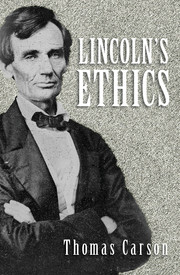Book contents
- Frontmatter
- Dedication
- Epigraph
- Contents
- Detailed Contents
- List of Maps and Figures
- Acknowledgments
- How This Book Came to Be
- 1 Introduction
- PART ONE LINCOLN THE POLITICIAN AND COMMANDER IN CHIEF
- 2 Lincoln's Evolving Policies Regarding Slavery: Compromise and Utilitarianism
- 3 Habeas Corpus, Colonization, and the Status and Rights of Free African Americans
- 4 Did the Union Have Just Cause for Fighting the American Civil War?
- 5 Jus in Bello: Did the Union Fight the War Justly?
- 6 Moral Luck and Lincoln's Good Moral Luck
- PART TWO LINCOLN'S MORAL CHARACTER
- Bibliography
- Index
- Plate Section
4 - Did the Union Have Just Cause for Fighting the American Civil War?
from PART ONE - LINCOLN THE POLITICIAN AND COMMANDER IN CHIEF
Published online by Cambridge University Press: 05 May 2015
- Frontmatter
- Dedication
- Epigraph
- Contents
- Detailed Contents
- List of Maps and Figures
- Acknowledgments
- How This Book Came to Be
- 1 Introduction
- PART ONE LINCOLN THE POLITICIAN AND COMMANDER IN CHIEF
- 2 Lincoln's Evolving Policies Regarding Slavery: Compromise and Utilitarianism
- 3 Habeas Corpus, Colonization, and the Status and Rights of Free African Americans
- 4 Did the Union Have Just Cause for Fighting the American Civil War?
- 5 Jus in Bello: Did the Union Fight the War Justly?
- 6 Moral Luck and Lincoln's Good Moral Luck
- PART TWO LINCOLN'S MORAL CHARACTER
- Bibliography
- Index
- Plate Section
Summary
Earlier, in Chapter 2, I defended some of Lincoln's most controversial actions and policies on the grounds that they were necessary for him to fight and win the Civil War. These arguments presuppose the justice of the Union cause in the war, but this assumption is open to question and needs to be defended.
The question of the justice of the Union cause in the war is particularly important for assessing Lincoln's ethics because, as we have seen, he played a decisive role in determining that the North would fight a civil war rather than allow the Confederate states to secede peacefully, as the Confederacy strongly preferred. Many people in the North, including many abolitionists, also wanted to “let the South go in peace.” But Lincoln deliberately risked provoking the South into beginning the war when he resupplied Fort Sumter against the advice of most of his close military and civilian advisors (see Chapter 2.I.2). In so doing, he succeeded in uniting public opinion in the North to fight the war, and so he clearly bore great personal responsibility for its outbreak.
The question of whether the Union had just cause for fighting the war needs to be divided into distinct questions that address the justice of fighting (or continuing to fight) the war at different times.
There appears to be a case for saying that, when the Civil War began, the Union did not have adequate moral grounds for fighting it. It is debatable whether the good of keeping the Union together and not creating a precedent for further instances of secession in the United States and other democratic nations were enough to justify the immense evil of all the death and suffering caused by the war. Yet there were other considerations that justified the Union in fighting the war. It would have been a catastrophe if the Confederate States of American (CSA) had gained its independence.
- Type
- Chapter
- Information
- Lincoln's Ethics , pp. 123 - 190Publisher: Cambridge University PressPrint publication year: 2015



